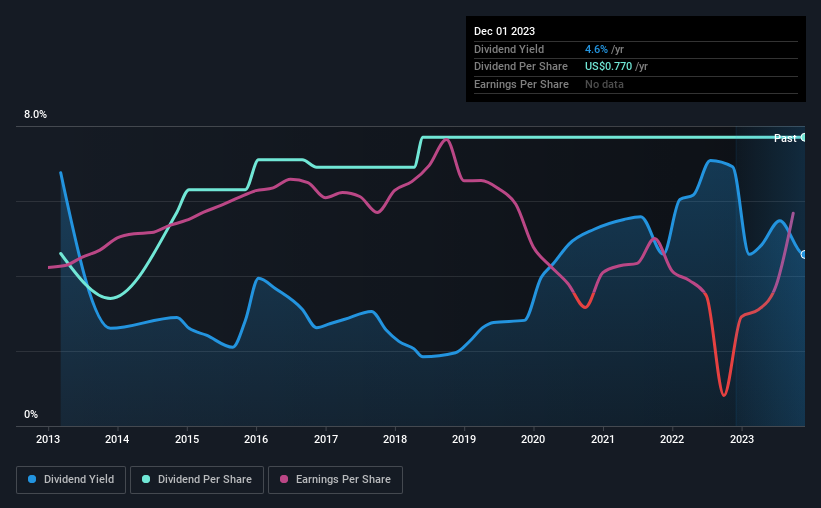Universal Insurance Holdings, Inc. (NYSE:UVE) Will Pay A US$0.29 Dividend In Four Days
Readers hoping to buy Universal Insurance Holdings, Inc. (NYSE:UVE) for its dividend will need to make their move shortly, as the stock is about to trade ex-dividend. The ex-dividend date is one business day before the record date, which is the cut-off date for shareholders to be present on the company's books to be eligible for a dividend payment. The ex-dividend date is important because any transaction on a stock needs to have been settled before the record date in order to be eligible for a dividend. Thus, you can purchase Universal Insurance Holdings' shares before the 7th of December in order to receive the dividend, which the company will pay on the 15th of December.
The company's next dividend payment will be US$0.29 per share, on the back of last year when the company paid a total of US$0.77 to shareholders. Looking at the last 12 months of distributions, Universal Insurance Holdings has a trailing yield of approximately 4.6% on its current stock price of $16.83. Dividends are a major contributor to investment returns for long term holders, but only if the dividend continues to be paid. We need to see whether the dividend is covered by earnings and if it's growing.
Check out our latest analysis for Universal Insurance Holdings
Dividends are usually paid out of company profits, so if a company pays out more than it earned then its dividend is usually at greater risk of being cut. That's why it's good to see Universal Insurance Holdings paying out a modest 27% of its earnings.
When a company paid out less in dividends than it earned in profit, this generally suggests its dividend is affordable. The lower the % of its profit that it pays out, the greater the margin of safety for the dividend if the business enters a downturn.
Click here to see how much of its profit Universal Insurance Holdings paid out over the last 12 months.
Have Earnings And Dividends Been Growing?
Businesses with shrinking earnings are tricky from a dividend perspective. If earnings decline and the company is forced to cut its dividend, investors could watch the value of their investment go up in smoke. So we're not too excited that Universal Insurance Holdings's earnings are down 4.3% a year over the past five years.
Many investors will assess a company's dividend performance by evaluating how much the dividend payments have changed over time. Since the start of our data, 10 years ago, Universal Insurance Holdings has lifted its dividend by approximately 5.3% a year on average.
Final Takeaway
Should investors buy Universal Insurance Holdings for the upcoming dividend? Earnings per share have shrunk noticeably in recent years, although we like that the company has a low payout ratio. This could suggest a cut to the dividend may not be a major risk in the near future. In sum this is a middling combination, and we find it hard to get excited about the company from a dividend perspective.
So if you want to do more digging on Universal Insurance Holdings, you'll find it worthwhile knowing the risks that this stock faces. Our analysis shows 2 warning signs for Universal Insurance Holdings and you should be aware of these before buying any shares.
Generally, we wouldn't recommend just buying the first dividend stock you see. Here's a curated list of interesting stocks that are strong dividend payers.
Have feedback on this article? Concerned about the content? Get in touch with us directly. Alternatively, email editorial-team (at) simplywallst.com.
This article by Simply Wall St is general in nature. We provide commentary based on historical data and analyst forecasts only using an unbiased methodology and our articles are not intended to be financial advice. It does not constitute a recommendation to buy or sell any stock, and does not take account of your objectives, or your financial situation. We aim to bring you long-term focused analysis driven by fundamental data. Note that our analysis may not factor in the latest price-sensitive company announcements or qualitative material. Simply Wall St has no position in any stocks mentioned.

